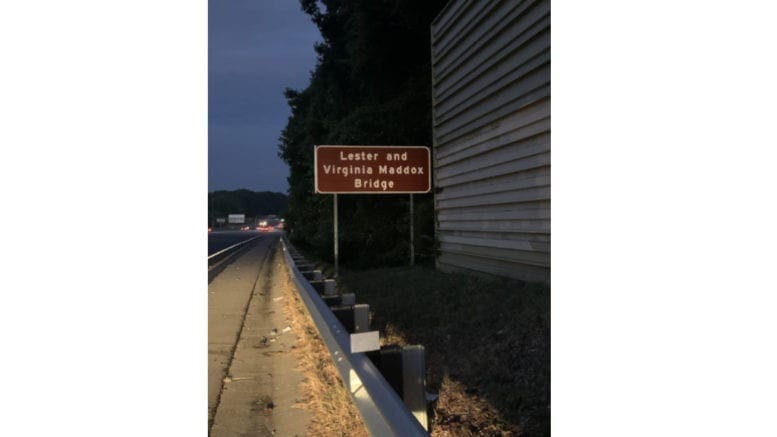A KSU professor and an activist group are calling for the name of a bridge and highway dedicated to a staunch segregationist and racist Georgia governor, Lester Maddox, to be removed and/or renamed.
KSU Professor of Economics and Development Authority of Cobb County member J.C. Bradbury said that in light of Confederate and other racist monuments coming down in Decatur and nationwide, the Lester and Virginia Maddox Bridge should be renamed.
A local activist group named Axe Maddox is also waging a campaign for the Maddox bridge and highway to be changed.
Axe Maddox began about two years ago, when they started a petition to have the Georgia State House and Senate remove the name of the Maddox bridge and highway.
The petition has a couple hundred signatures and calls for ridding away with symbols of the racist, “Old South” across Georgia.
“Lester Maddox proved through his behavior to be a part of the Old South,” an Axe Maddox spokesperson, who spoke on condition of anonymity, said. “As the years pass, having landmarks named after such a person provide daily, subtle reminders of failed ideologies and values to each new generation. Both of these landmarks are an homage to the Old South and they only hinder progress. They have no place in a society that promotes progress.”
Axe Maddox representatives said their campaign name is wordplay on the ax handle Maddox often showed off as a symbol of his racism and pro-segregationist stances and policies.
A spokesperson said their ultimate goal was to “ax” Maddox’s name from the bridge and interstate.
The Lester and Virginia Maddox Bridge is located on Interstate 75 in Cobb County, separating Cobb from Fulton County, near Truist Park. The bridge crosses the Chattahoochee River.
Another area dedicated to Lester Maddox is a portion of Highway 41 between Marietta Street and Northside Drive in Atlanta, named after him.
Lester Maddox and his wife Hattie Virginia Maddox owned the Pickrick Restaurant, a fried chicken restaurant near the Georgia Institute of Technology in Atlanta.
Lester Maddox gained national notoriety — and praise — when he denied Black activists the right to eat at his restaurant a few days after the Civil Rights Act of 1964 had been passed.
Maddox carried a pistol while his son and white supporters held wooden ax handles to chase away the Black activists attempting to desegregate the Pickrick. The wooden ax handle was known among Maddox supporters as “Pickrick drumsticks” and became a symbol of Maddox’s political campaign.
Maddox challenged the Civil Rights Act and when he lost and was told he had to desegregate his restaurant, Maddox closed down the Pickrick rather than allow Black people to eat there. He believed racial integration to be a Communist plot that was “ungodly, un-Christian and un-American,” according to the New York Times.
The chasing down of Black Civil Rights activists and refusal to adhere to federal integration laws propelled Maddox to fame among Georgia officials. After multiple failed attempts at running for office earlier in his life, Maddox became the 75th governor of Georgia from 1967 through 1971.
Maddox supported arch-segregationist George Wallace’s 1968 bid for president, held a rally for a Ku Klux Klan Grand Dragon in Atlanta and referred to Martin Luther King, Jr. as “an enemy of our country” after King’s assassination.
Maddox defended his pro-segregation stance until the day he died, saying that he wanted the white race to be preserved and that “forced segregation is illegal and wrong,” according to the New York Times.
Maddox was a Democrat and after governor became lieutenant governor under Jimmy Carter.
The Georgia Senate dedicated the bridge crossing the Chattahoochee to Maddox in 1999. Then senators credited Maddox for being a “recognized leader in providing public services for its citizens” and increasing economic growth in the state.
Locals recognize Maddox differently.
“ … Lester Maddox was an avowed racist and proponent of segregation,” Bradbury said. “I don’t think his legacy is something we should celebrate. The Henry L. ‘Hank’ Aaron Bridge would be an obvious improvement, but only if Mr. Aaron thought it was appropriate.”
Bradbury proposed naming the bridge after the famous Black baseball player, who is also the senior vice president of the Atlanta Braves.
Although Axe Maddox said they would like to see the name removed, a spokesperson said renaming the bridge after someone with progressive values is also an option that Axe Maddox supports.
Axe Maddox said that they feel the local and nationwide removal of statues in honor of white supremacy by state governments and protestors gives them more momentum than they had two years ago.
“Racism plays a huge role in the restraint of both justice and equality,” a spokesperson said. “I think people have taken notice of this, and the movement towards progress for each and every American has garnered a new and energetic wave of support. People are paying attention and refuse to sit still any longer.”

Arielle Robinson is an undergrad at Kennesaw State University. She is the president of the university’s Society of Professional Journalists and an editor at the KSU Sentinel. She enjoys music, reading poetry and non-fiction books and collecting books and records.

Lester Maddox’s name causes me to cringe whenever I cross the bridge….He would appear on late night television, ride his bike backwards and was a buffoon with an axe handle in hand ready to take out Af/Am from his restaurant.
I’m sooooo mad that this sign was down and now up again. How can I help to get it down permanently?